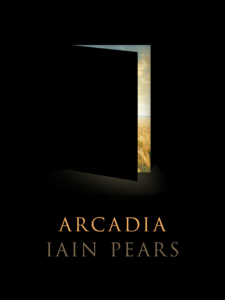Allen & Unwin
August 2015
 Iain Pears’ latest novel, Arcadia is not one story but many. Taking place over several different timelines, with multiple interlocking characters and plots, it is an ambitious and wide-scoped piece. Pears has also worked to create a complementary app to assist readers in their journey through the book. Unfortunately, I was unable to access this app on my Android phone for whatever reason, so instead of taking the option of choosing my own adventure through the story, I was more or less forced to read it straight through as it appears in the book. A perfectly fine way to read any novel, but one that did not take full advantage of Arcadia’s possibilities.
Iain Pears’ latest novel, Arcadia is not one story but many. Taking place over several different timelines, with multiple interlocking characters and plots, it is an ambitious and wide-scoped piece. Pears has also worked to create a complementary app to assist readers in their journey through the book. Unfortunately, I was unable to access this app on my Android phone for whatever reason, so instead of taking the option of choosing my own adventure through the story, I was more or less forced to read it straight through as it appears in the book. A perfectly fine way to read any novel, but one that did not take full advantage of Arcadia’s possibilities.
Reading the novel front to back lays out the story in a mostly chronological fashion. The story is reasonably complex and there are a large number of threads. Because of this, it moves quite slowly and some time can pass between the plots of certain characters being taken up. I found it a bit too slow for my liking, and would have preferred less information about the physics of how everything worked and more of it actually working, though each character’s particular rambles – Angela Meerson and Henry Lytten being the chief offenders – are indicative of character.
I did get a bit worn out by all the staid musings about what it meant to be English and England. Is it a peculiarity of the English to wax lyrical about the peculiarities of the English? I don’t care. I’m sick of talking about it. Go away.
There are a few nods to sci fi and fantasy greats. The story itself is somewhat remeniscent of David Mitchell’s Cloud Atlas, in the way that various timelines and potentially various universes interact and influence one another. There are lots of references to Tolkien’s imagination, and a few to C.S Lewis as well, amongst others. Fans of genre will have a good time picking out references and sly nods.
The characters are generally entertaining, with strong and distinct voices and their own narrative oddities. This is quite delightful, especially when it comes to the women characters, who are interesting without being the kind of badass tough woman so many male authors seem to think is what is needed in a “strong female character”. Admittedly, this is less of a problem than it has been in the past, but it still pops up occasionally, so credit where it’s due.
Fans with the ability to should certainly download the app. By all accounts it contributes to the experience of the novel and allows the reader a great amount of flexibility and interaction. But regardless of whether you choose to take part in that part of the story or not, Arcadia is a fascinating and surprising work that promises many delights to those who seek them.

